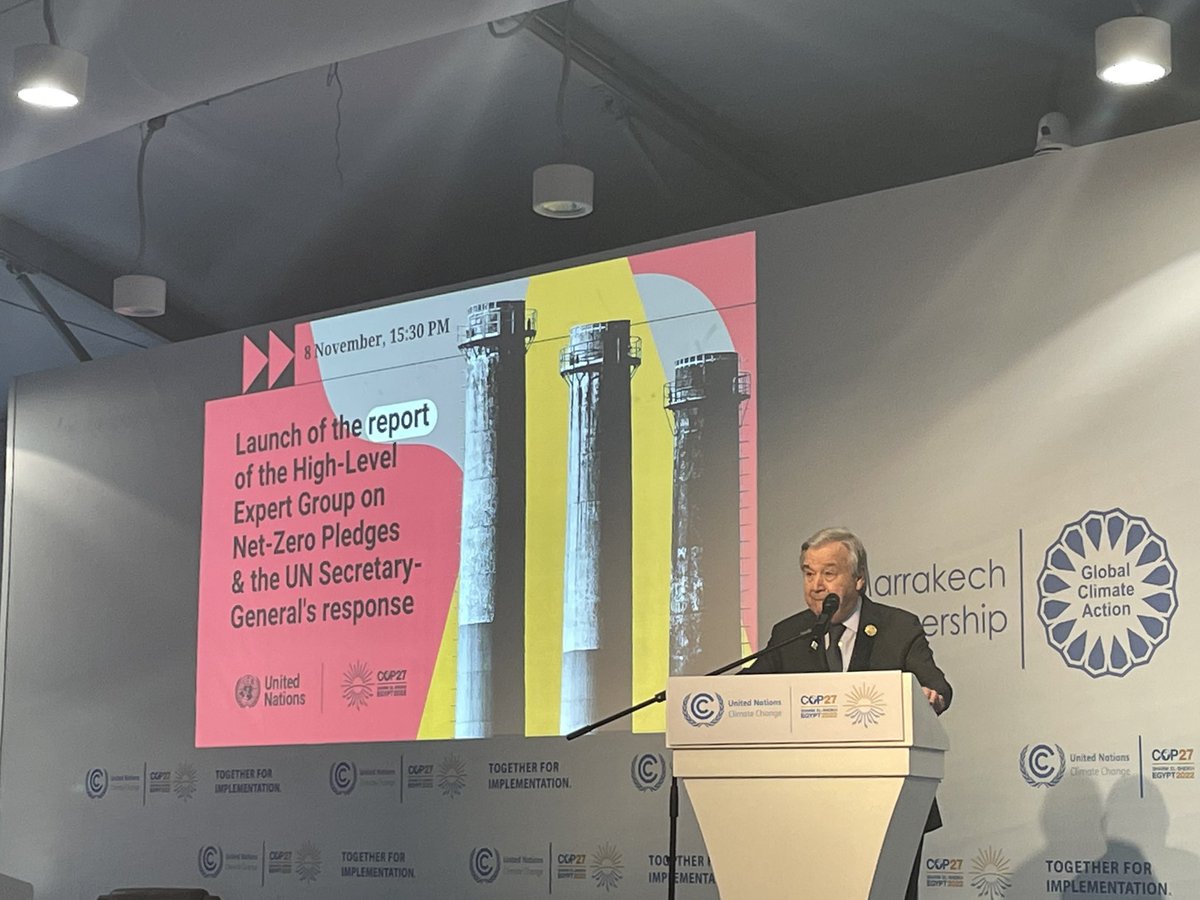BREAKING: at #COP27, the UN Secretary General’s high-level expert group is releasing a new standard to turn empty net-zero commitments into meaningful climate action. Stick with me for details - it’s very good news 🧵 

HLEG Chair @cathmckenna gives us the highlights. From now on, a real commitment from businesses, investors, and cities to #NetZero must mean:
🚫No more fossil fuels - that means no new oil, gas and coal projects and no new $$ for fossils
🚫No more fossil fuels - that means no new oil, gas and coal projects and no new $$ for fossils
🌳No deforestation
💨No hot air offsets instead of real, immediate emissions reductions
🌐A commitment to reducing emissions across the full supply-chain - that means NZ commitments must address scope 1,2, AND 3 emissions
💨No hot air offsets instead of real, immediate emissions reductions
🌐A commitment to reducing emissions across the full supply-chain - that means NZ commitments must address scope 1,2, AND 3 emissions
👩⚖️No lobbying to undermine ambitious climate, energy, and environmental policies, either directly or through business associations
📈 Aligning capital expenditures with net zero targets & linking executive compensation to climate action and demonstrated results
📈 Aligning capital expenditures with net zero targets & linking executive compensation to climate action and demonstrated results
UN Secretary General @antonioguterres on the stage now emphasizing one of the biggest recommendations in the report:
📜 Net-zero pledges need to move from voluntary commitments to regulated requirements. Otherwise they risk greenwashing and creating an uneven playing field.
📜 Net-zero pledges need to move from voluntary commitments to regulated requirements. Otherwise they risk greenwashing and creating an uneven playing field.

👷🏾♀️HLEG member @ZeniZeniMalango now talking about net zero plans needing to have #JustTransition at their core. This requires financial institutions and multinational corporations to work with governments and Multinational Development Finance Institutions to be more ambitious. 

🧾Only 1/3 of publicly traded businesses have committed to net-zero, even fewer private state-owned entities. Commitments that do exist are poor quality with little accountability. The solution: way more transparency and public reporting, including a public dashboard.
🔋Here’s a big one - Helena Vines Fiestas of @BNPPAM_COM shares a recommendation for a multilateral net-zero regulatory task force to enforce NZ integrity 

💰@GhoshArunabha shares some critical thinking from the HLEG on how to use high-integrity net-zero commitments to crowd resources and investments into countries in the global south. 

And that’s a wrap. Read the full report! un.org/sites/un2.un.o…
Congrats to HLEG members @cathmckenna @Starbuck @GhoshArunabha @BillHareClimate Camila Escobar @LopesInsights Zhou Xiaochaun,Gunther Thallinger,Helena Fiestas, @jfelson Jessica Omukuti @jlevyoficial @ZeniZeniMalango
Congrats to HLEG members @cathmckenna @Starbuck @GhoshArunabha @BillHareClimate Camila Escobar @LopesInsights Zhou Xiaochaun,Gunther Thallinger,Helena Fiestas, @jfelson Jessica Omukuti @jlevyoficial @ZeniZeniMalango

@MaryNicholsCA Kahori Miyake, Oumar Tatam Ly, Rod Carr
• • •
Missing some Tweet in this thread? You can try to
force a refresh









